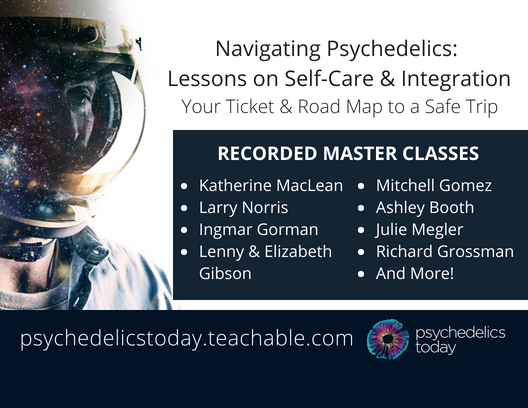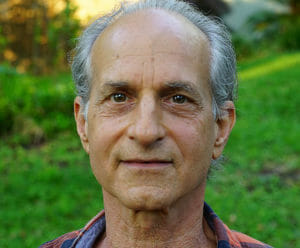In this episode, Joe holds conversation with Dr. Michael Sapiro, Clinical Psychologist out of Boise, Idaho. They cover topics surrounding how meditation and mindfulness intersect with psychedelia as well as psychic ability, altered states and integration.
3 Key Points:
- Meditation and psychedelics have a lot of overlap such as ego dissolution and unity.
- Dr. Sapiro believes that meditation and mindfulness bring personal awakening in order to create collective transformation.
- Both meditation and psychedelics are the most beneficial when they are integrated into our waking life and when we use our experiences to help others and our planet.
Support the show
- Patreon
- Leave us a review on iTunes
- Share us with your friends – favorite podcast, etc
- Join our Facebook group - Psychedelics Today group – Find the others and create community.
Navigating Psychedelics
Show Notes
About Dr. Michael Sapiro
- Attended John F Kennedy University where he received his PsyD
- He focused on meditation research at the Institute of Noetic Sciences
- He is from Chicago, IL
- He spent time in Thailand for the Peace Corps
- A lot of his experience was from his time in the Bay Area
- There is more data coming out about awareness based meditative states and psychedelic states and how they relate subjectively to each other
Dr. Sapiro’s Practice
- Transformational Psychology, Integration based
- He integrates the Buddhist Dharma, Western Psychology, Non-dual meditation and philosophy, and Noetic Sciences into his practice
- Michael sees 20-28 patients a week
- Kashmir Shaivism
- It's a dissolving type of experience, Its a non-dualistic style of tradition
- The non-dual tradition helps one just be “whole and unbroken” and focus on the present and now
- He does the human work in the Buddhism Dharma style, and the spiritual work with the restful piece of being in the now, the focus being integration
Vision
- His vision has been on enhancing personal awakening in order to create collective transformation
- He wants to help communities and states and nations to transform via individual awakening
- He has worked with law enforcement agents, military vets, community members, a variety of people at different levels all the way from grounding to stability to thriving
- He always ends each Sangha with saying 'take this work and apply it to your neighbors'
- A Sangha is a buddhist community of monks/individuals in support of each other
- “People have such a deep connection to nature when you come out of the psychedelic experience. You start taking care of the environment differently than before went you went in.” - Michael
- “We now have data on greater environmental concern and stewardship after the psychedelic experience.” - Joe
- People who are consciously interacting with things outside of themselves have a greater care for those things. “If I am hurting the world I am hurting myself.” - Michael
- “Hopefully one of the bigger things that come out of the psychedelic movement are greater levels of environmentalism and global stewardship” - Joe
- The psychedelic movement helps us see systems that are made up are a part of our tangible reality and our responsibility to take care of the people in the systems
- We can use psychedelics and meditation, and integration from these experiences, to see how we can operate in these systems and help people find resources in these systems
Dr. Sapiro’s Work
- He teaches as Esalen Institute leading workshops
- One of his colleagues has reached over 200,000 people with their work since 2011
- His goal isn't to be the lead, but the support of leaders, especially women because he feels the need for a balance and the need for more female leaders
- Michael says he loves surrounding himself around ‘world-changers’ and loves doing anything to be around them and learn from them
Boise, Idaho
- Michael says its surprisingly conscious state
- Its very community oriented
- There are 6-7 Buddhist Sanghas, groups of dedicated folks to their practice
- There is a lot of nature and nature is Dharma, it is the teacher
Psychic Ability and Altered States
- It's very normal for humans to have psychic experiences
- All of us have access to these states, we just have to tap into them
- Michael encourages people to accept and cultivate these experiences
- It may be better to accept these experiences than to deny them
- There is a difference between energetic flow and psychosis
- Crazy Wise is a documentary that touches on spiritual emergence issues
The Overlap of Psychedelic States and Meditation
- The Institute of Noetic Sciences had a program called The Future of Meditation Research
- They found in the research that they were only looking at reducing anxiety and depression, the clinical applications
- But they found that more than half of the people experienced psychic phenomenon, mystical experiences, terrifying experiences, the things that overlap/correlate with psychedelic experiences
- Both meditative and psychedelic experiences point to ego dissolution and unity at the same time
- Ego and anxiety both have wisdom in them, we don't want to lose them completely, but learn how to balance them and use them wisely
- “We need to be mindful of how we integrate what we learn in the psychedelic/meditative state into our waking life” - Michael
- “How can meditation and psychedelics lend themselves to being the best version of ourselves while committing to others well being? That is what I am most passionate about.” - Michael
- David Trellen and Willoughby Britton - Trauma Sensitive Mindfulness
- “If we are choosing to be more compassionate to our fellow humans and the earth, let’s not tough it out, let's help each other.” - Joe
- “Let’s do the work that it takes to heal it.” - Michael
- Be open, be curious. What might meditation be able to bring to personal awakening in order to create collective transformation?
Links
About Dr. Michael Sapiro
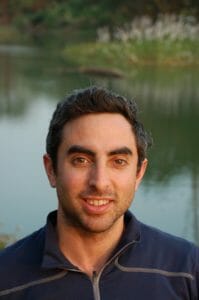
Michael Sapiro, PsyD, is a psychologist, meditation teacher, and former Buddhist monk. He lives and works on the frontier of spirituality, social justice, science, and psychology. He earned his Doctorate in Clinical Psychology from John F. Kennedy University and holds a Master’s in English Studies. He is a consultant with the Institute of Noetic Sciences and is on faculty at Esalen Institute. Michael is the founder of Maitri House Yoga and was trained for 20 years in both traditional Yoga philosophy and lifestyle, and Buddhist meditation. In his treatment he integrates Western psychological interventions with meditation and awareness practices. He finds the greatest healing comes from living a life of presence, vulnerability, and awareness. At Sage he will fully integrate Yoga philosophy and life-style within the treatment.
Download
In this episode Joe interviews, Richie Ogulnick, a long time Ibogaine provider and enthusiast. During the show they discuss Ibogaine and Addiction-Interruption Therapy.
3 Key Points:
- Ibogaine is a compound found in the Tabernanthe Iboga plant that has been used to treat opioid and other addictions.
- Ibogaine has shown to have the power to reset the biochemistry of a person to a non-addictive state, and reduce/eliminate the agonizing symptoms of withdrawal, allowing a person to heal from an addiction.
- The combination of Ibogaine, relocation and integration therapy is the best scenario for healing someone and preventing them from relapse.
Support the show
- Patreon
- Leave us a review on iTunes
- Share us with your friends – favorite podcast, etc
- Join our Facebook group - Psychedelics Today group – Find the others and create community.
Navigating Psychedelics
Show Notes
About Richie
- In 1989 he was Introduced to Ibogaine while visiting family and friends in New York
- Its an alkaloid extracted from a West African shrub
- He was ready to fall in love with doing something with purpose
- He came across an article about a corporation called NDA created by Howard Lotsof
- When Howard (a heroine addict) was 19 years old, a chemist gave him a dose of Ibogaine
- A few days later, he realized he “wasn't afraid” and then he realized he wasn't having opioid withdrawals
- In “Needle Park”, a park in New York, heroin addicts come there for free needles
- Richie’s dream was to dose all the addicts with Ibogaine, and that only a quarter of them would show up to Needle Park because they were not addicted anymore
- He brought 13 grams of Ibogaine back from Africa with him
- He received a chapter from a book (Healing Journey) called Ibogaine: Fantasy and Reality by Claudio Naranjo
- People were coming from all over the world to receive Ibogaine treatments
- It was 15 years where he conducted over 750 psycho-spiritual and addiction-interception sessions underground
- Upon training people, those people would then go and open their own treatment centers in Mexico, abroad, etc.
What is Iboga
- Tabernanthe Iboga is the plant
- Ibogaine Hydrochloride is the best product to use to interrupt addiction and symptoms of withdrawal from an addiction
- Ibogaine is safe as long as someone has had an EKG that has been looked at very closely for any red flags
- Other than cardiac risk and previous suicidality, schizophrenia, psychotic breaks there aren't many more threats to being treated with Ibogaine
The Miracle Compound
- “There is a miracle compound in ibogaine. There is nothing I have come across on the planet that can reset the biochemistry to a pre-addictive state, that can bring a person to make a choice without the agony of the symptoms of withdrawal.” - Richie
- There is a 36 hour window where a person has a life review, what brought them to the addictive process in the first place, the person's willingness and maturity
- It creates a symbiotic relationship for a person to explore themselves with insight
- Relapse is possible if they don't work on the reason they became addicted in the first place
- It's the witness component that Ibogaine delivers that helps people process through their addiction
- Ibogaine as a molecule has a really pharmacologically complex, alien like structure
Relapse
- Justin Hoffman, a DJ in Las Vegas runs Holistic House, a facility where people get to relax and get out of their previous context for a week or two after treatment
- If a family wanted to help out their family member who is addicted to heroine, Richie says that he asks the family about relocation because it's a big part of reducing relapse
- He also says that finding a proper therapist to help afterward is huge too
- The combination of Ibogaine, relocation and integration therapy is the best scenario for healing someone and preventing them from relapse
Big Pharma’s Impact
- Joe says how he got a message from Dana Biel, talking about how the harm reduction movement has been manipulated by the ‘Big Pharma’ industry, especially suboxone
- Richie says that drugs like suboxone are prescribed to be used everyday for the rest of someone's life, and Ibogaine is a “one-time-only” style drug that doesn't require alot of money to heal people
- Ibogaine is not profitable so its not attractive to Big Pharma
- “Ibogaine will never hit the streets like LSD did. It's not a recreational experience, it's a long, daunting 3 stage process.” - Richie
Use Cases
- He knows of a story where these two ladies took Ibogaine daily for their Parkinson's, and as soon as they stopped taking Ibogaine, they got their symptoms back
- He knows of another lady who had been walking with a cane and upon taking Ibogaine she was walking a mile around her neighborhood without her cane
Final Thoughts
- Joe asks if Richie thinks we are over harvesting Iboga
- There is the Wakanga tree that contains a small amount of Ibogaine, so he thinks we are okay
- Ibogaine is an important subject because a lot of people are dying from opiates
- Ibogaine is available in Portugal but it hasn't had much activity
- It can be used for therapeutic use as well as addiction-interruption
Links
Richie Ogulnick is a long time Ibogaine provider and enthusiast Over the course of fifteen and a half years, he conducted about 750 sessions, including addiction-interruption treatments. He spent the next several years referring close to 1,000 more people to other ibogaine providers. During that time, he also trained doctors and ex-addicts who opened ibogaine centers throughout the world. Richie feels a pull to focus again on the more therapeutic and psycho-spiritual treatments where he is able to offer his expertise in ibogaine treatment along with his knowledge of reintegration with individuals who are looking to deepen and enrich their life experience.
In this Episode, Joe interviews Brad Burge, Director of Strategic Communications at MAPS. In this episode they discuss the Phase 3 Trial for MDMA Assisted Psychotherapy, contradictions and Expanded Access.
3 Key Points:
- MAPS is about to run Phase 3 Trials of MDMA Assisted Psychotherapy
- If MDMA passes this third phase, it will still be tricky to get insurance involved. But the cost of one series of MDMA Therapy is much cheaper than a lifetime of typical pharmaceutical drugs and therapy sessions to heal PTSD.
- The only reason for-profit companies haven't gotten involved before was because there wasn't a promise on their investment. Finally, for-profit companies (like Compass Pathways) are interested in advancing these medicines (Psilocybin and MDMA).
Support the show
- Patreon
- Leave us a review on iTunes
- Share us with your friends – favorite podcast, etc
- Join our Facebook group - Psychedelics Today group – Find the others and create community.
Navigating Psychedelics
Show Notes
MAPS
- Brad Burge is the Director of Strategic Communications at MAPS, the Multidisciplinary Association for Psychedelic Studies
- MAPS started out as just a few employees in 2009 and has grown to over 40 now
Phase 3 Study
- They are now in Phase 3 Trials
- They started recruiting at 14 sites (US, Canada and Israel) and are recruiting 150 volunteers with severe PTSD
- Participation
The Future of MDMA Assisted Therapy
- Breakthrough Therapy Designation
- After phase 3 trials, if all goes well, it would mean that MDMA would be the drug to be used (only) alongside Psychotherapy
- MAPS is training therapists, counselors and social workers
- One way to get more people educated who are interested in this would be taking therapy interns in and having them gain credits for interning and learning alongside trained therapists
Access
- Expanded Access is known as ‘compassionate use’, a program by the FDA that allows people to receive a treatment that is still in trials
- In order to administer the therapy you are required to get a DEA schedule 1 license
- “If there’s one thing that changes public perspective on psychedelic therapy, its individual stories of people who have been healed, transformed by or positively or even negatively affected by them in some way” - Brad
- They have published many studies of the trials
- The most recent was the Boulder study, 76% of people didn't have PTSD a year after MDMA assisted therapy
- Insurance won't cover expanded access, it will have to pass Phase 3 trials until insurance can be used in MDMA Assisted Psychotherapy
- The MDMA is a very small cost (fraction) of the total cost, it’s the hours on hours of psychotherapy that cost so much
- But the cost of one MDMA Therapy Session process is much cheaper than a lifetime of pharmaceutical drugs and therapy sessions to heal PTSD
Argument
- Joe says he hears this strange argument that people say “giving soldiers MDMA just makes war easier”
- Brad says it's not about putting these people back into war, it's about healing the retired veterans to help them adapt back into their everyday life
- “MDMA Assisted Psychotherapy is going to make them a better lover not a better fighter” - Brad
- “If there's one commonality in psychedelic experiences, its that things are connected.” - Brad
Compass Pathways
- Joe mentions that people are scared to see a business come in that's acting like a normal pharmaceutical company
- MAPS is not tied at all with Compass Pathways
- Out of the top two things Americans are mad about, at least one of them is the Pharmaceutical Industry
- Finally, for-profit companies are interested in advancing these medicines (MDMA)
- The only reason for-profit companies haven't gotten involved before was because there wasn't a promise on their investment
- Capitalism has a tendency to put profit first
- “Money can be used for good as well as evil” - Brad
- MAPS has raised over 70 billion dollars all from donations
- Compass owns its own safety data
- Part of the goal of a patent is to protect the investment
Zendo Project
- MAPS Psychedelic Harm Reduction and Peer Support resource
- Tim Ferriss has volunteered for Zendo
- They are always looking for new volunteers
- They offer trainings on site at the events
- They will be hosting a harm reduction webinar right before festival season
Rave Act
- The Department of Justice announced that providing free water and harm reduction education are not violations of the rave act
- Amend the Rave Act
Pharmaceutical MDMA
- The pharmaceutical grade MDMA costs 800,000 for one kilogram
- It won't be available in bottles, it will be available in bubble packs
- More than one is never needed
Involvement
- 2021 or 2022 is the next Psychedelic Science Conference
- Joe is starting a Psychedelic Club in Breckenridge, CO
Links
About Brad
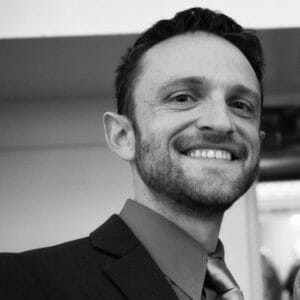
Brad Burge is Director of Strategic Communications at the non-profit Multidisciplinary Association for Psychedelic Studies (MAPS). Brad earned his B.A. in Communication and Psychology from Stanford University in 2005 and his M.A. in Communication from the University of California, San Diego in 2009. He began working with MAPS in 2009, where he engages daily with journalists and media producers around the world to enhance public knowledge about psychedelic research, while also helping develop and evolve MAPS' brand and outreach strategy. Brad is passionate about finding healthier, more effective, and more compassionate ways for humans to work with the pharmaceutical and digital communications technologies of the 21st century. When he’s not plugged in, you’ll find him in the mountains, carrying a backpack, somewhere down a long trail.
Download
In this episode, hosts Joe and Kyle sit down and engage in conversation together, covering topics such as Kyle’s capstone project, Trauma and Breath: A Clinical Approach to Trauma Resolution Utilizing Breathwork, current events, upcoming plans and the hurdles as a Psychedelic education and information company in a space of both ethical and unethical findings.
3 Key Points
- Kyle will be soon finishing his capstone project, Trauma and Breath: A Clinical Approach to Trauma Resolution Utilizing Breathwork.
- The project is on the clinical application of Breathwork Therapy. The goal will be to use an Integrative Breathwork Therapy model that can be used adjunct to Psychedelic Therapy.
- Joe and Kyle find out about a lot of things that are potentially harmful in the psychedelic world. They are “journalists”, but without money for legal defense. It’s a difficult time, where a lot of unethical stuff is happening around psychedelics, and Joe and Kyle feel responsible for the safety of the community.
Support the show
- Patreon
- Leave us a review on iTunes
- Share us with your friends – favorite podcast, etc
- Join our Facebook group - Psychedelics Today group – Find the others and create community.
Navigating Psychedelics
Show Notes
Kyle
- Kyle’s been doing an internship a few days a week and has been doing undergraduate student counselling
- He’s been working on his capstone project that has consumed a ton of his time and energy
- He wants to thank Elizabeth Gibson and Alan Davis who have been reviewing his capstone project for him
Breathwork Therapy Capstone
- Writing the capstone in the Clinical Mental Health Counseling Program means it needed to have clinical applications
- Kyle went to the MDMA Training in 2016, and he talked to Michael Mithoefer, who told him that if he wants to get involved, to figure out something that can be an adjunct to psychedelic therapy
- Kyle thought that he could use an Integrative Breathwork Therapy model that could then be used adjunct to Psychedelic Therapy
Styles of Breathing
- A deep, slow belly breath can be very activating to the parasympathetic nervous system that calms the body down
- A fast, intense breath can be more active and can bring out traumas
The Phases
- Phase 1: Grounding and Emotional Regulation (slow, deep breath, the therapeutic alliance)
- They screen for people that have had a traumatic experience, spiritual emergence or psychosis in the last 6 months so they know where to start with a patient
- They use a capscore (a test that looks at the severity of someone’s PTSD) to determine where to start in therapy
- Joe mentions that it would be beneficial to see what level of capscore a patient responds positively or negatively to a Breathwork session
- Phase 2: Using Breathwork in a somatic processing phase
- Stage 1: Somatic experiencing (helping people breathe into the sensations in the body)
- The body has a ‘secret language’, of how our body holds onto trauma
- Turning inward and being more in touch with inner sensations (tightness, heat, etc)
- Stage 2: A more activating of “blockages” by intensifying or speeding up the breath
- Stage 1: Somatic experiencing (helping people breathe into the sensations in the body)
- Phase 3: Outside of the clinical scope, placing someone in a full group, 3 hour Breathwork that might bring up collective traumas or spiritual experiences
- The goal would be to get people through therapy to get them to the larger group process, create community and form social connections
- It needs to start with the clinical space, one-on-one to generate trust. Once they have that trust and confidence, they can go out and explore the more transpersonal and spiritual aspect of themselves
Bandwidth in Communication
- We have modems, cable, fiber optics, 3g, 4g, 5g cell networks, etc.
- Video communication, phone conversation is great, but it's 2D
- When its in person, depth of field kicks in, you're able to see body language and intonation
- Living in a tribe of 150 people and creating community, we'd be using our full bandwidth, bringing the human organism back to its full capacity
- "Therapists get taught clinical practices, but they aren't taught about theory and practice of trauma” - Joe
Psychedelic News Responsibility
- MAPS just published an article about an online Breathwork workshop
- Joe says its not a bad thing, but there are risks by not having an in person facilitator
- “We find out about a lot of things that are potentially harmful in the psychedelic world, our relationship to coming out about that stuff is tricky. Yes, we are “journalists”, but without money for legal defense.” - Joe
- Joe says he feels responsibility for safety in the community
- Kyle says the psychedelic community sometimes feels like the wild west due to the lack of education. “When unethical stuff arises, what is our responsibility?” - Kyle
- “We are trying to understand our future, and not put ourselves in a bad place, all while keeping you all safe and continuing to serve the community” - Joe
- How LSD alters our consciousness
Psychedelics Today Books
Trip Journal
Integration Workbook
Both books will be on Amazon for purchase in the next few weeks
Arizona Psychedelic Conference
- Arizona Psychedelic Conference
- Joe and Kyle will be guiding 2 Breathwork workshops
- They are excited to connect and meet people
- Kyle and Joe will be going to another conference in March
- The title of the conference is “Can Exceptional Experiences Save Humans, from Ecological Crisis”
- “If were going to survive on earth, we've got to be a little more global. We are all linked to this spaceship that we are traveling through space on, and there are limited resources on this thing. We are answering a lot of these questions through psychedelics” - Joe
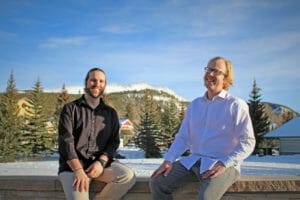
About Kyle
Kyle’s interest in exploring non-ordinary states of consciousness began when he was 16-years-old when he suffered a traumatic snowboarding accident. Waking up after having a near-death experience changed Kyle’s life. Since then, Kyle has earned his B.A. in Transpersonal Psychology, where he studied the healing potential of non-ordinary states of consciousness by exploring shamanism, plant medicine, Holotropic Breathwork, and the roots/benefits of psychedelic psychotherapy. Kyle has co-taught two college-level courses. One of the courses Kyle created as a capstone project, “Stanislav Grof’s Psychology of Extraordinary Experiences,” and the other one which he co-created, “The History of Psychedelics.”
Kyle is currently pursuing his M.S. in clinical mental health counseling with an emphasis in somatic psychology. Kyle’s clinical background in mental health consists of working with at-risk teenagers in crisis and with individuals experiencing an early-episode of psychosis. Kyle also facilitates Transpersonal Breathwork workshops.
About Joe
Joe studied philosophy in New Hampshire, where he earned his B.A.. After stumbling upon the work of Stanislav Grof during his undergraduate years, Joe began participating in Holotropic Breathwork workshops in Vermont in 2003. Joe helped facilitate Holotropic and Transpersonal Breathwork workshops while he spent his time in New England. He is now working in the software industry as well as hosting a few podcasts. Joe now coordinates Dreamshadow Transpersonal Breathwork workshops, in Breckenridge, Colorado.

